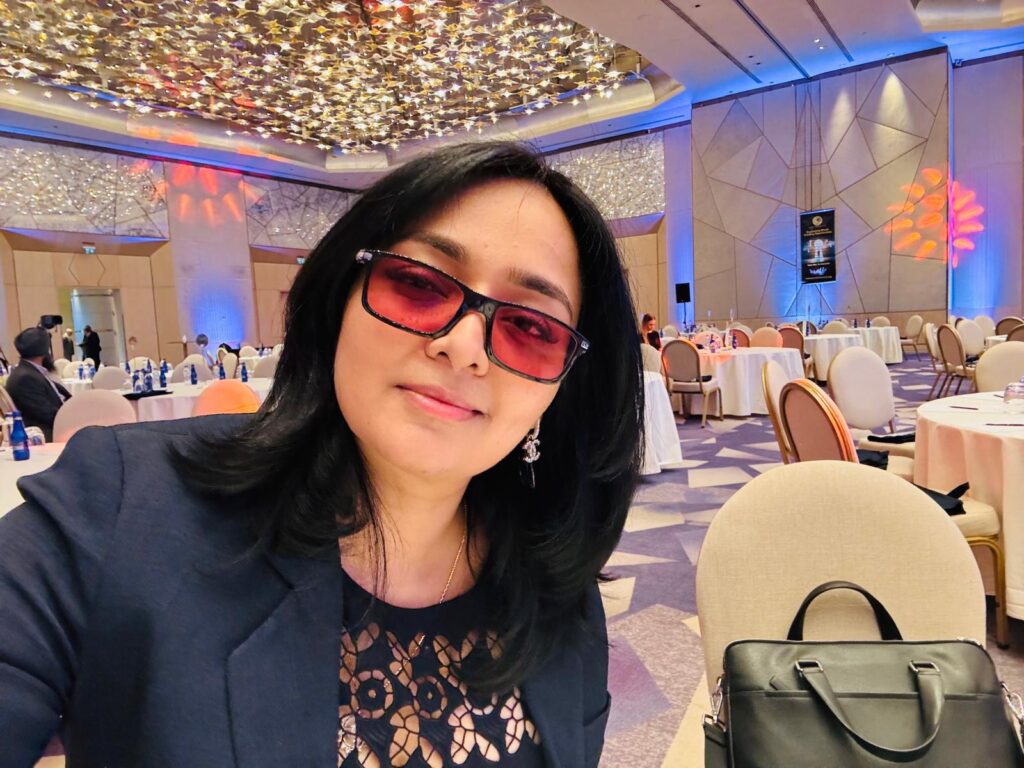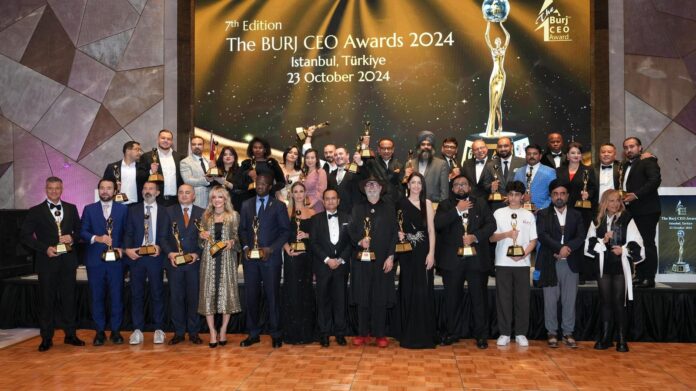In an exclusive interview, Ms. Sia N. Ashok, Managing Partner of Confity Capital Partners and recipient of the 7th Edition Burj CEO Award for Strategic Leadership, shares insights on the strategic vision and innovative leadership that drive her success.
1. Congratulations on winning the Burj CEO Award for Strategic Leadership! What does this recognition mean to you and your team at Confity Capital Partners?
Thank you very much! It’s truly an honor to receive the Burj CEO Award for Strategic Leadership. This recognition is not just a personal achievement; it reflects the dedication, hard work, and vision of our entire team at Confity Capital Partners. Our approach has always been centered around impactful leadership and building long-term, sustainable value in emerging markets. This award reaffirms our commitment to these principles and serves as a powerful motivator to continue pushing the boundaries in sectors like aviation, healthcare, and technology.
I would also like to extend a heartfelt thanks to Dr. Tariq and Mrs. Sarah Dong for organizing this remarkable event, which brings together a diverse global business community. Their efforts in creating a platform that fosters collaboration and celebrates leadership are truly inspiring. We are grateful for this opportunity to connect with leaders from around the world and share our vision for growth and innovation.
2. Can you share a few key strategic decisions or initiatives you implemented at Confity Capital Partners that have been pivotal in shaping the company’s growth and vision?
At Confity Capital Partners, our growth and vision are driven by three key strategic initiatives. First, sector diversification across industries such as aviation, healthcare, technology, and drone technology allows us to seize emerging opportunities while managing market risks. Second, our strategic advisory services, including financial planning, capital structuring, and risk management, empower clients with tailored guidance to achieve their long-term goals. Lastly, our focus on emerging technologies enables transformative investments that enhance patient outcomes in healthcare and revolutionize logistics and surveillance in aviation and drones. Together, these initiatives establish Confity as a forward-thinking firm committed to impactful growth.
3. How does your background in design thinking influence your approach to strategic leadership and problem-solving in your organization?
Design thinking, centered on empathy, collaboration, and iterative problem-solving, strongly shapes my leadership approach. By deeply understanding the perspectives of clients, partners, and team members, I drive user-centered, innovative solutions. In practice, this involves open dialogue, rapid prototyping, and ongoing feedback, which we apply when entering new markets or launching initiatives to ensure adaptability and reduce risk. This approach fosters creativity, agility, and resilience within our team, allowing us to address challenges holistically, balance strategic goals, and create meaningful, impactful outcomes that align with the organization’s growth vision.
4. What motivated you to enter the growth equity space, and how does your role as Managing Partner enable you to bring about transformational change for the companies you invest in?
My motivation to enter growth equity comes from a strong passion for driving innovation and supporting visionary companies as they scale. Growth equity allows me to engage with companies during critical stages, helping them reach their full potential and make a significant impact. As Managing Partner at Confity Capital Partners, I provide not only capital but also hands-on guidance, collaborating with leadership on strategic expansion, operational efficiency, and technology integration. Leveraging design thinking and business transformation expertise, we build adaptable frameworks for sustainable growth. Empowering businesses toward long-term success fuels my commitment to growth equity and Confity’s mission.

5. Your work with ERP/SAP projects has impacted organizations across various sectors. Could you share some best practices for successful implementations that can serve as a guide for other leaders?
My experience implementing ERP solutions and best practices with Fortune 500 companies provided a solid foundation for transitioning to the growth equity market. Working closely with large-scale organizations across various sectors enriched my understanding of operational efficiency, strategic alignment, and the value of resilient infrastructures. Over the years, I gained firsthand insight into the complexities of scaling businesses, managing change, and fostering sustainable growth—all crucial for evaluating and guiding companies in the growth equity space. This background enables me to bring a hands-on, strategic perspective to growth equity, ensuring that our investments are well-positioned for impactful, long-term success.
6. As a Business Transformation SME, how do you help organizations adapt to large-scale digital transformation projects, and what’s your advice for leaders managing these initiatives?
As a Business Transformation SME, I have had the opportunity to help organizations adapt to digital transformation by focusing on strategic alignment, strong change management, and phased implementation. I was able to guide teams in defining clear objectives that align with their long-term goals, ensuring technology solutions are purpose-driven. Effective change management is crucial, as it helps employees embrace new systems and processes, reducing resistance and ensuring smoother adoption. I also recommend a phased rollout to allow for adjustments and minimize disruption.
For leaders, my advice is to prioritize clear communication, engage stakeholders early, and maintain flexibility. Digital transformation is a journey—embracing adaptability and continuous improvement can make all the difference in achieving lasting success.
Strategic Acumen & Design Thinking
7. As someone recognized for your thought leadership, how do you foster a culture of innovation and strategic thinking within your teams?
Fostering a culture of innovation and strategic thinking within my teams begins with creating an environment that encourages curiosity, open communication, and continuous learning. I promote cross-functional collaboration and regularly hold brainstorming sessions to explore diverse perspectives and new ideas. Empowering team members with ownership of their projects is key; it builds confidence and motivates them to think creatively and strategically. I also strive to lead by example, modeling a willingness to take calculated risks and embrace new approaches. By celebrating both successful outcomes and learning experiences, I try to cultivate a culture where innovation thrives, and strategic thinking becomes second nature.
Personal Motivation & Life Balance
8. Outside of work, you’re passionate about yoga and healthy living. How does this dedication to wellness impact your work-life balance and performance?
My dedication to yoga and healthy living plays a crucial role in maintaining my work-life balance and enhancing my performance. Yoga helps me stay centered, manage stress, and approach challenges with clarity, which is invaluable in a high-stakes environment. Prioritizing wellness allows me to maintain energy and focus, making me more effective and resilient in my role. This commitment to health also extends to how I lead; I advocate for balance and wellness within my team, encouraging practices that support sustained performance and overall well-being.
9. You have a diverse professional background and have studied at prestigious institutions like Northwestern University’s Kellogg School of Business. What role has continuous education played in your career, and how do you encourage others to keep learning?
Continuous education has been a cornerstone of my career, providing me with the tools and insights to navigate evolving business landscapes. Studying at institutions like Northwestern University’s Kellogg School of Business enriched my strategic thinking and broadened my perspective, allowing me to bring innovative solutions to complex challenges. I believe learning is a lifelong journey, and I encourage my team to stay curious and pursue growth opportunities. I support their development through mentorship, training programs, and by fostering an environment where asking questions and exploring new ideas is always encouraged. This commitment to learning keeps us agile, adaptable, and ahead of the curve.
Burj CEO Awards & Global Impact
10. The Burj CEO Awards are often called the “Oscars of the business world.” What role do you think such awards play in motivating leaders and fostering innovation on a global scale?
The Burj CEO Awards and Summit serve as powerful motivators, celebrating excellence and recognizing visionary achievements that inspire leaders across industries. By spotlighting innovative approaches, these awards set benchmarks and encourage leaders to push boundaries, fostering a culture of bold, transformative thinking. The summit offers a unique platform for global networking and collaboration, where leaders connect, share insights, and explore cross-border partnerships essential in today’s interconnected economy. This environment facilitates the exchange of sustainable business practices and collaborative solutions for complex global challenges. Together, the awards and summit drive impactful growth, support emerging market opportunities, and contribute to a resilient, globally interconnected business community.
11. What advice do you have for emerging leaders who aspire to one day receive recognition similar to the Burj CEO Award for Strategic Leadership?
My advice for emerging leaders aiming for recognition like the Burj CEO Award for Strategic Leadership is to focus on building a strong foundation of integrity, resilience, and a clear vision. Start by understanding your unique strengths and values, and lead with authenticity. Prioritize continuous learning and remain adaptable in the face of challenges. Cultivate a collaborative mindset, listen actively, and seek diverse perspectives. Finally, stay committed to creating value—not just for your organization, but for your community and industry. True leadership is about making a meaningful impact, and recognition follows when you dedicate yourself to this purpose.
